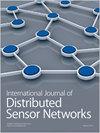Distributed consensus problem with caching on federated learning framework
IF 2.5
4区 计算机科学
Q3 COMPUTER SCIENCE, INFORMATION SYSTEMS
International Journal of Distributed Sensor Networks
Pub Date : 2022-04-01
DOI:10.1177/15501329221092932
引用次数: 0
Abstract
Federated learning framework facilitates more applications of deep learning algorithms on the existing network architectures, where the model parameters are aggregated in a centralized manner. However, some of federated learning participants are often inaccessible, such as in a power shortage or dormant state. That will force us to explore the possibility that the parameter aggregation is operated in an ad hoc manner, which is based on consensus computing. On the contrary, since caching mechanism is indispensable to any federated learning mobile node, it is necessary to investigate the connection between it and consensus computing. In this article, we first propose a novel federated learning paradigm, which supports an ad hoc operation mode for federated learning participants. Second, a discrete-time dynamic equation and its control law are formulated to satisfy the demands from federated learning framework, with a quantized caching scheme designed to mask the uncertainties from both asynchronous updates and measurement noises. Then, the consensus conditions and the convergence of the consensus protocol are deduced analytically, and a quantized caching strategy to optimize the convergence speed is provided. Our major contribution is to give the basic theories of distributed consensus problem for federated learning framework, and the theoretical results are validated by numerical simulations.联邦学习框架上缓存的分布式一致性问题
联邦学习框架促进了深度学习算法在现有网络体系结构上的更多应用,其中模型参数以集中的方式聚合。然而,一些联邦学习参与者经常无法访问,例如在电力短缺或休眠状态下。这将迫使我们探索以一种基于共识计算的特殊方式操作参数聚合的可能性。相反,由于缓存机制对于任何联合学习移动节点都是必不可少的,因此有必要研究它与共识计算之间的联系。在本文中,我们首先提出了一种新的联邦学习范式,它支持联邦学习参与者的特别操作模式。其次,根据联邦学习框架的要求,建立离散时间动态方程及其控制律,并采用量化缓存方案来掩盖异步更新和测量噪声带来的不确定性。然后,解析推导了共识协议的一致性条件和收敛性,并给出了优化收敛速度的量化缓存策略。我们的主要贡献是给出了联邦学习框架分布式共识问题的基本理论,并通过数值模拟对理论结果进行了验证。
本文章由计算机程序翻译,如有差异,请以英文原文为准。
求助全文
约1分钟内获得全文
求助全文
来源期刊
CiteScore
6.50
自引率
4.30%
发文量
94
审稿时长
3.6 months
期刊介绍:
International Journal of Distributed Sensor Networks (IJDSN) is a JCR ranked, peer-reviewed, open access journal that focuses on applied research and applications of sensor networks. The goal of this journal is to provide a forum for the publication of important research contributions in developing high performance computing solutions to problems arising from the complexities of these sensor network systems. Articles highlight advances in uses of sensor network systems for solving computational tasks in manufacturing, engineering and environmental systems.

 求助内容:
求助内容: 应助结果提醒方式:
应助结果提醒方式:


